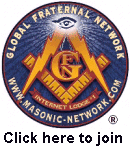
The GFN Treasure Chest Archives
www.masonic-network.com
"Where Master Masons Communicate"

 |
The GFN Treasure Chest Archiveswww.masonic-network.com |
 |
Brother Elbert Bede has said, "Freemasonry is the only Fraternity claiming to have landmarks, and the only Fraternity old enough to have Landmarks" under the accepted definition of a Landmark by Mackey "is that it must have existed from time whereof the memory of man runneth not to the contrary."
Brother and Dr. George Oliver in his 'Historical Landmarks' said in referring to the Four Old Lodges that formed the Premier Grand Lodge: "that every privilege which they collectively enjoyed by virtue of their immemorial rights, they should still continue to enjoy and that no law, rule or regulation should ever deprive them of such privilege, or encroach on any Landmark which was at that time established as the standard of Masonic government." The Masonic government and Landmark Brother Oliver was referring to were the Old Charges, (The Charges of a Freemason,) which were contained in the "Constitutions of the Freemasons" of 1723.
So by the definition of a Landmark as given by Mackey the Old Charges certainly do qualify as a Landmark, and this among some other places is where to look for the source and reference to Masonic Law.
"The Charges of a Free-Mason" are said to be "Extracted from The Ancient Records of Lodges beyond the Sea, and of those in England, Scotland, and Ireland, for the use of the Lodges in London." In the Charges is this admonition: "To be read at the making of New Brethren, or when the master shall order it." This reminds me of the admonition given in the installation ceremony of the Master of a Lodge, where he is admonished by the Installing Officer to cause the Book of Constitutions, "to be read in his Lodge, so that none may pretend ignorance of the excellent precepts it enjoins."i
Under general heading #1, of the Old Charges, "Concerning God and Religion" we will read "A Mason is obliged, by his Tenure, to obey the Moral Law." This is what Masonic Law #2 of Minnesota is all about. In this Masonic Law it then proceeds to tell what this law teaches, persistently and earnestly, such as "charity and probity, industry and sobriety, and obedience to law and civil government," which should be 'the rule and guide of every Mason and which the fraternity expects strict conformity.'
Charity as used in Masonry does not always and only mean the giving of money and assistance to those who are less fortunate and to whom we will do what we can to help them in their present situation. We willingly do that, but it comes from the original meaning of the word Charity: Charity means love, love of ones fellow-man. It means good-will toward others too, which is why we want to do what we can for those who are less fortunate than ourselves. It also means being lenient, especially in judgment of others and of their actions. We do not want to be unduly harsh in dealing with others.
Probity is a word you don't hear much in general conversation, but the meaning here is virtue and integrity, uprightness and honesty, being a man whose word is unquestioned. Information on this can be found under general heading #VI "Of Behavior," subheading 5 "Behavior at Home, and in Your Neighborhood" where it says in part: "You are to act as a moral and wise man; particularly not to let your Family, Friends, and neighbors know the Concerns of the Lodge, etc., but wisely to consult your own Honor."
Industry is a word that is either alluded to or used in Masonry quite a bit. In the fifteen points from the Regius Poem, point number two says; "The workman shall labor diligently on work days, that he may deserve his holidays." Freemasonry is a society of friends and brothers that honors honest labor. We are taught in the three degrees of the Blue Lodge that honesty, integrity and industry are traits to be developed. In the third section of the lecture of the Third Degree it tells us that the Bee Hive is an emblem of industry, and that industry is recommended to all created beings. Freemasonry teaches us that we should always be industrious, and never be content to sit back and ignore the suffering of our fellow-man when we could do something to alleviate it. Every Mason who delivers, or hears, the lecture of the third degree will hear how important Freemasonry treats industry.
Sobriety would imply that a Mason should not come to his Lodge while he is inebriated, but in the Charges under general heading #VI "Of Behavior" item #2 "Behavior After Lodge is Over and the Brethren Not Gone," in the first paragraph it talks about avoiding excess and not encouraging a Brother to eat or drink beyond his inclination, as well as not doing or saying anything offensive, or something that might prevent an easy and free conversation. This is an interesting charge to read if you're inclined to be interested in things such as this. Sobriety has to do with being temperate and this is reinforced in the Charge at Closing where it says; "Be diligent, prudent, temperate, discreet." Also in the Charge of the First Degree it says; "And to yourself, in avoiding all irregularity and intemperance, which may impair your faculties, or debase the dignity of your profession. A zealous attachment to these duties will insure public and private esteem." Temperate means practicing moderation, being self-restrained, not being extreme in our opinions and not letting our passion lead us; this includes not only the use of alcoholic beverages but in other things as well. The definition you find in the dictionary of the word Temperate will, most likely, remind you of freemasonry. Finally in the Charge of the Third Degree it says: "Your virtue, honor, and reputation, are concerned in supporting with dignity the character you now bear. Let no motive, therefore, make you swerve from your duty, violate your vows or betray your trust, etc." So, sobriety is important in Freemasonry.
Obedience to Law and Civil Government is very easy for a Mason to understand because it is also stressed in the Charge of the First Degree, but it is also in the Old Charges as general heading II "Of the Civil Magistrate Supreme and Subordinate:"
"A Mason is to be a Peaceable Subject to the Civil Powers, wherever he resides and works, and is never to be concerned in Plots and Conspiracies against the Peace and Welfare of the Nation nor to behave himself undutifully to inferior Magistrates; for as Masonry hath been always injured by War, Bloodshed, and Confusion, so ancient Kings and Princes have been much disposed to encourage the Craftsman, because of their Peaceable ness and Loyalty, whereby they practically answered the Cavils of their Adversaries, and promoted the Honor of the fraternity, who ever flourished in times of peace. So that if a Brother should be a Rebel against the State, he is not to be countenanced in his Rebellion, however he may be pitied as an unhappy man; and if convicted of no other Crime, though the loyal Brotherhood must and ought to disown his Rebellion, and give no Umbrage or Ground of political Jealousy to the Government for the time being; they cannot expel him from the Lodge, and his relation to it remains indefeasible."
From the Charge of the First Degree as adopted by the Baltimore Convention in 1843 about citizenship: "As a Citizen you are enjoined to be exemplary in the discharge of your civil duties, be never proposing, or countenancing, any act which may have a tendency to subvert the peace and good order of society; by paying due obedience to the laws under whose protection you live, and by never losing sight of the allegiance due to your country."
From this, I think, is where the wording about citizenship evolved in the Charge of the First Degree : "In the state you are to be a quiet and peaceful subject, true to your government and just to your country; you are not to countenance disloyalty or rebellion, but patiently submit to legal authority and conform with cheerfulness to the government of the country in which you live."
"The ancient [old] charges show by what principles the relations of those of the fellowship to each other were regulated; and these may not improperly be said to have been 'Landmarks' of the Craft." Brother Albert Pike